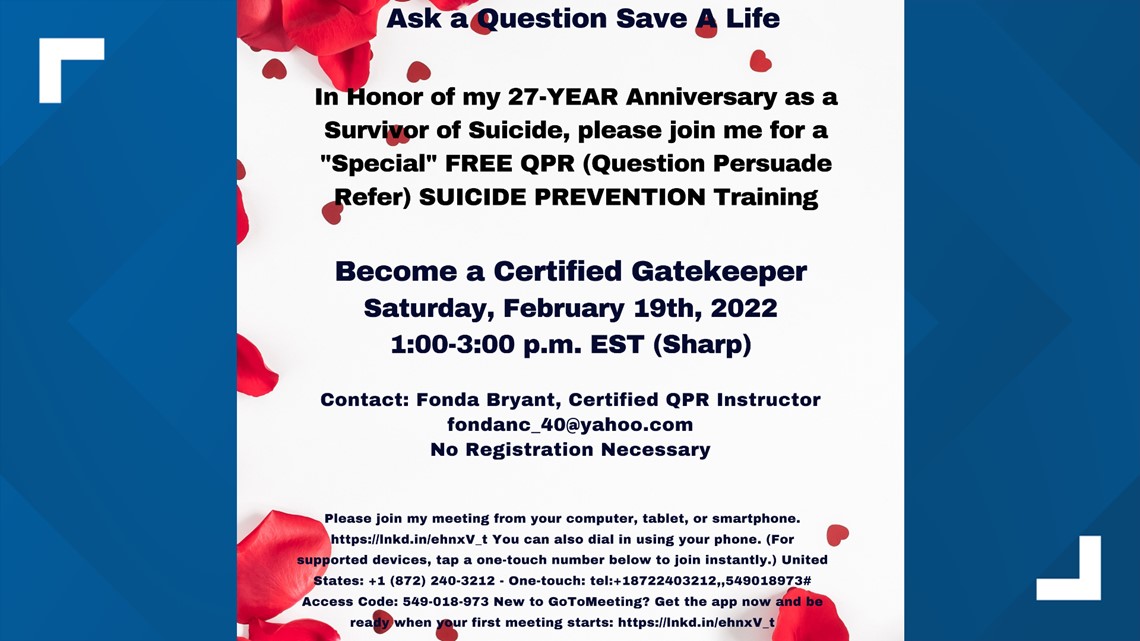CHARLOTTE, N.C. — Every day, people across the country struggle with mental health issues -- some suffering in silence. At times, the mental health battle tragically ends in suicide.
Mental health and suicide prevention advocate Fonda Bryant said the thoughts and actions of a person suffering with depression or suicidal thoughts may not look like what people expect.
"Mental health does not care who we are,” Bryant said.
Bryant said it can impact anyone because it warps reality.
“It distorts everything," Bryant said. "You can have everything going for yourself and depression is telling you still, you’re a loser.”
Bryant said social media helps to mask it.
“We put us smiling, traveling, doing things, wearing beautiful clothes," Bryant said. "But on the inside, we’re coming apart.”
Bryant said she knows firsthand what it's like to wrestle with suicide.
“The thing is I really want people to realize, we didn’t want to die," Bryant said. "In that moment, we’re dealing with excruciating pain from the top of our head to the bottom of our feet.”
Bryant said her life was only spared thanks to a phone call with an aunt.
“She recognized that something was wrong, and she called me back and asked me, 'Are you going to kill yourself?'" Bryant said. "And I said yes. And she went into action."
Bryant said many people don’t reach out for help, fearing judgment.
“That stigma," Bryant said, "Oh, 'They can't handle their job,' 'What do you mean you're depressed,' 'You have money, you have looks.' If you're going to judge us, we’re going to shut down because see we already feel worthless. We already feel hopeless.”
Instead, Piedmont Medical Center psychiatrist Dr. Brian Mika said its important to normalize the conversation about suicide and depression to help with healing help instead of harm.
“If you’re having thoughts that I’m feeling overwhelmed, I’m feeling depressed, I’m feeling down, I’m not sure how I can go on and that’s when you get the help and that’s perfectly normal," Mika said.
Paying attention to the big and small signs can oftentimes help save a life too.
“The absence of emotion is troubling and concerning sign and you want to investigate that. Talk to people," Mika said.
Bryant said anyone reaching out should be taken seriously. She said asking simple questions like "What did you mean by that" and "Are you OK" could make all the difference.
“We don’t all come out and say you know, I'm going to hurt myself," Bryant said. "It can be very cryptic.”
Bryant said it's important to recognize the things people aren't saying. It's why Bryant holds free virtual suicide prevention classes so more people can recognize the signs.
“The thing is with suicide, it leaves questions," Bryant said. "Why didn't I check on them, why didn’t I know the signs, why didn’t I reach out, why didn’t they reach out to me? Those will bother you for the rest of your life."
Some of the signs Bryant said could indicate someone is suffering are a change in behavior or personality, isolating, eating or sleeping too much or too little, self-medicating, and an infatuation with death. She said if thoughts and symptoms like these last more than two weeks and interfere with everyday life, you should see a professional immediately if you can, but even talking with a friend can help.
If you would like to join one of Byrant's free virtual suicide prevention classes, you can contact her via email at fondanc_40@yahoo.com or reach out to her on Facebook, Instagram or Twitter.


If you or a loved one are facing thoughts of suicide or self-harm, there is help readily available. You can call The National Suicide Prevention Lifeline at 800-273-8255 or chat with them online. There are also resources in North Carolina available here and in South Carolina available here.
Contact Lana Harris at lharris@wcnc.com and follow her on Facebook, Twitter and Instagram. Contact Briana Harper at bharper@wcnc.com and follow her on Facebook, Twitter and Instagram.

